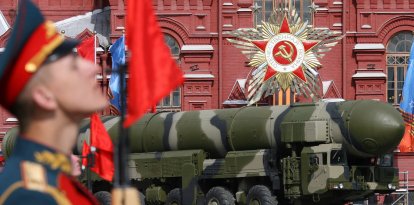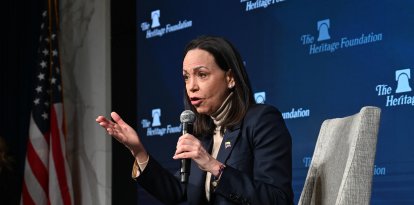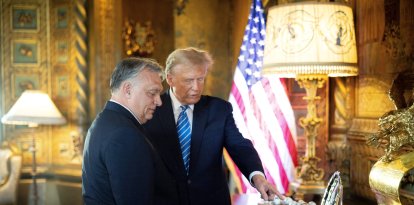Political executions, nuclear race and the 'Commission of Death': Who was Ebrahim Raisi, Iran's president known as 'the butcher of Tehran'?
Seen as the successor to the supreme leader, Ali Khamenei, he came to power in 2021 after almost forty years of political career.

Wikimedia Commons
Ebrahim Raisi, president of Iran and seen as the natural successor to Ali Khamenei, supreme leader since 1989, died on Sunday after the helicopter carrying him crashed. The 63-year-old had an extensive political record in his country, where he was known for increasing repression of dissent, for pushing the nuclear program and even for being a member of a 'Death Commission', responsible for thousands of assassinations.
The air incident set off alarm bells in the Middle East, which is already in a chaotic situation due to the war between Israel and Hamas, since he was a key figure within Iran's Shiite theocracy.
Who is Ebrahim Raisi?
He was born on December 14, 1960, into a family of Persian clerics. He grew up amid the fervor of the Islamic Revolution that overthrew the monarchy in the late 1970s. He lost his father at the age of five, and there is extensive debate about his upbringing. Although he attended the Ayatollah Mousavinejad Theological School, he claims to have obtained a doctorate in jurisprudence and private law from Shahid Motahari University, something that was disputed even in Iran. In the 2021 presidential elections, another of the candidates assured that "Ebrahim Reisi's academic education was only six literacy classes and that is not enough to govern the country."
Regarding his political career, he took his first steps in the judiciary at age 20, where he began to climb quickly. In 1981, he was appointed prosecutor of the city of Karaj, a position he held simultaneously in the city of Hamadan.
His role in the 'Death Commission'
His work there led to his transfer to Tehran, where he caught the attention of Ruhollah Khomeini, leader of the 1979 Islamic Revolution and later supreme leader until 1999. According to an Amnesty International report, Khomeini appointed Raisi to the "1988 Death Commission." Composed of four people, they evaluated the "loyalty" of the already sentenced prisoners to the Islamic Republic and paved the way for the death of between 4,500 and 5,000 people.
Many years later, in 2019, the U.S. Treasury Department sanctioned Raisi for "its administrative oversight of the executions of persons who were minors at the time of the crime and of the torture and other cruel, inhuman or degrading treatment or punishment of prisoners in Iran, including amputations," including his role in the 1988 executions. The United States also accused him of human rights violations for decades.
After Khomeini's death, he found an ally in Ali Khamenei, who facilitated his appointment as Tehran prosecutor and then as head of the National Inspection Agency. His career took a leap in 2004 when he was appointed vice president of the Supreme Court in 2004, serving for 10 years.
His judicial career was notable primarily for pushing for the imprisonments and political executions of dissident Iranians.
In 2017, he had a failed presidential bid when he fell to Hasan Rohani, who beat him by almost 20 percentage points. On that occasion, Raisi's campaign was based on tripling subsidies, creating new housing and "fighting corruption."
Nuclear race and persecution of dissent: Raisi's presidency
Not letting defeat discourage him, he tried again in 2021 when he was finally elected president of the Islamic Republic of Iran. Seen as the natural successor to Ali Khamenei, his tenure is notable for increasing pressure against dissent, continuing the nuclear plan, and raising tensions with Israel to the maximum.
He ordered a more severe application of the hijab, the veil that covers the head and chest for Muslim women, mandatory from 2022. His government was marked by the murder in state custody of the young Jina Mahsa Amini, who was arrested because the morality police considered that she was not wearing the hijab appropriately.
Regarding his nuclear ambitions, as reported by AFP, "Raisi supported the country's enrichment of uranium to near weapons-grade levels, as well as hindering international inspectors as part of his confrontation with the West."
Finally, in relation to Israel, he supported the April attack in which more than 300 missiles were fired at the Jewish State, marking Iran's first direct attack on Israel.

























